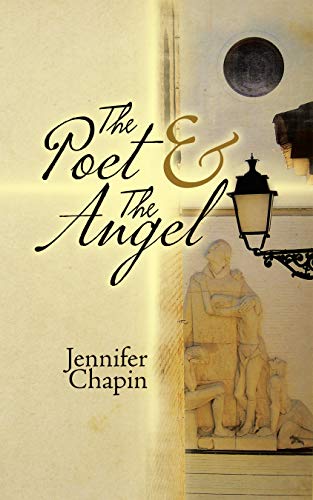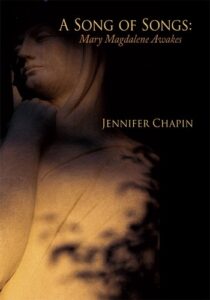
The Poet & The Angel received a 4+ star review, making it an IndieReader Approved title.
Following find an interview with author Jennifer Chapin.
What is the name of the book and when was it published?
The Poet & The Angel, published in 2019.
What’s the book’s first line?
“When Angelina threw open her shutters, weary and wooden with time, the first thing she saw was a skylark hovering in the mists overlooking the Alhambra.”
What’s the book about? Give us the “pitch”.
The book is about the murder of Federica Garcia Lorca, Spain’s “Man of Letters’, by the Fascists at the outbreak of the Spanish Civil War. His body, like thousands of others yet to be uncovered and returned to their families, was never found. Lorca was a-political and yet he was very outspoken against the government and their allies, the Catholic Church.
General Franco, the dictator of Spain, acknowledged that he was carrying out a crusade against his enemies like the one that was carried out by Queen Isabella 1 and King Ferdinand 11, with their Inquisitors in tow. It was the earlier crusade that ended Arab rule in Spain in 1492.
In this book, written as a historical fantasy, a young girl in contemporary Spain, finds Lorca’s spirit huddled beneath a fountain in Granada. She is also suffering a deep wound. The book is a story of love and redemption, for both. It also gives Lorca back his voice and set him free.
What inspired you to write the book? A particular person? An event?
I am a passionate student of history and I was researching the Spanish Civil War. I was fascinated to learn that writers and artists, like Hemingway and Orwell, fought this war on the side of the Republicans. It was a war that saw Spain abandoned by other countries because of a perceived Communist incursion into Spain. As a result, Hitler and Mussolini were able to perfect their weaponry before it was turned on the rest of the world.
I was originally going to write about the larger war but kept coming up against the name of Federico Garcia Lorca, his poetry, his plays, his diaries and ultimately, his murder. I was soon drawn into Lorca’s mind and heart and traveled to Granada, Spain to follow his footsteps through the labyrinths of an ancient city where he was raised, educated, and ultimately died.
In short, I fell in love with him, and knew that an elegy versus a larger historical rumination on the war was more appropriate for me.
What’s the main reason someone should really read this book?
We are living in a time of false news and “cancel culture” where voices are being silenced and repressed and where “truth” is in short supply. In coercive regimes it is the writers and the intellectuals who are silenced first. It is those who voice their opposition to regimes that are persecuted, jailed, and often murdered.
I brought this book out in the aftermath of the murder and dismemberment of Jamal Khashoggi, Washington Post journalist, at the hands of the Saudis in Istanbul in 2018. Like Lorca, Khashoggi was left in an unmarked grave. His “crime” was to speak out against the Saudi Crown Prince and to lobby for more democratic reforms in Saudi Arabia.
Truth can never be cancelled, and the words of poets like Lorca or journalists like Khashoggi, can never be eradicated. If others care about this as well, if they are concerned about a rising censorship and oppressiveness in the world, then they may be interested in this book.
What’s the most distinctive thing about the main character? Who-real or fictional-would you say the character reminds you of?
In my case, because I studied Lorca’s words and life so ardently, I literally re-created him in this book. In many ways, his words, mannerisms, and anxieties became an intimate part of me, so much so that one could arguably say that I channeled him.
The most distinctive thing about his character was his kind and pure heart, the heart of a child, as Pablo Neruda once stated, along with his artistic brilliance. However, overriding all of this was his unequivocal pursuit of the truth, and his outspokenness against tyranny and hypocrisy.
When did you first decide to become an author?
I suppose in many ways my decision to become an author was not consciously made. I was raised from a young age to read widely. I think that reading and writing are intimate partners. My writing flowed from my imagination which was fed by my books. I can’t remember a time when I have not done both.
Is this the first book you’ve written?
My first book, A Song of Songs: Mary Magdalene Awakes”, was brought out in 2008. It was also written in an historical fantasy style. It tells the story of Mary Magdalene coming back at the “end of time”, which is now. I recently pulled the book and have started a re-write.
What do you do for work when you’re not writing?
I am a publishing consultant with Tellwell Publishing. I work to encourage authors of all ages and genres to bring their voices out, especially now.
How much time do you generally spend on your writing?
I am always writing in one form or another and this could be to the media, in my blog, and in my journal where I take notes for possible new stories.
What’s the best and the hardest part of being an indie?
I believe the best thing about being an Indie author is that you have full creative control over your work. Although you may be surrounded by a creative team if you come into an assisted self-publishing forum, you are still fully responsible for your own success.
You become an entrepreneur.
What’s a great piece of advice that you can share with fellow indie authors?
Believe in yourself and in your voice. Banish the perpetual critic that sits on your shoulder and do not be influenced by another’s opinion of your work prior to publishing. Above all, think EDITING AND MARKETING. In the publishing process, they are your best friends.
Finally, never give up. Your voice has immense value. Even if your book is read by one person only, you have made a huge difference.
Would you go traditional if a publisher came calling? If so, why?
No, because I would lose all control of the book. A new cover would be designed, it would be edited without my contributing voice and I would lose rights for my work. A traditional publisher would set my book price and my royalties.
I would rather have full control over my work and in my case, over the voice of my poet.
Traditional publishers, when they reject a book of an author, say that it is “not right for them.” I have experienced this. “It is a tension between art and commerce, “they say.
My thought in response is, “too bad, my book is right for me otherwise I would not have expended heart and soul to bring it out.”
If a work comes from the heart of authenticity, then there is no commercial conversation that is relevant, at least for me. Commerce and success follow a work written from the heart but should not be the reason to bring a book out in the first place.
Is there something in particular that motivates you (fame? fortune?)
I am motivated by justice and truth. I am motivated to speak with a voice that keeps people honest. I am motivated to uncover anything that does not represent the highest good for all and expose it.

